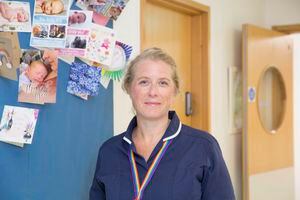Delivering maternity services
In the latest instalment of our series celebrating the Year of the Nurse, midwife Shelley Blake talks to Amanda Eulenkamp about the joys of her job

‘MIDWIVES are a really important part of people’s lives,’ says Shelley Blake, adding that no two days and no two births are ever the same.
‘We care for women from conception through to the weeks after the baby is born,’ she says. ‘We see them through complicated pregnancies to home births.
‘We are carers, counsellors, medics and friends, all in different order and at different times.’
Early steps
Shelley was ‘obsessed’ with nursing from a very young age. ‘No one in the house was exempt from me and my Fisher Price medical kit. I did some work experience in my local hospital on the maternity ward and was totally mesmerised by pregnancy and birth.’
Originally from Weymouth, Shelley went to university in Southampton, gaining a degree in midwifery. ‘At the time, this was a fairly new course and really hard work,’ she says. ‘I was juggling not only university course work and lectures, but working shifts to gain clinical experience.’
Shelley still keeps in touch with the girls she trained with. ‘They’ve been over and I showed them our hospital. They were blown away with it – said there was such a personal touch.’
Her role includes caring for patients from Sark, Alderney and Herm, ‘which adds a bit of extra excitement when you are called to go on the lifeboat or flying Christine. My husband works on the lifeboat, but in all the years we’ve never been together on one. I love boats and going to Herm adds a whole layer of uniqueness to the role.’
Main responsibilities
‘I work as the shift clinical lead, so I plan the day’s work as far as possible, coordinate and support all the staff on the ward, look at the rota to cover sickness and help care for women. No two days are the same, pregnancy and birth is very unpredictable, which makes work planning extremely difficult.
‘We can start the day with a few patients and finish with many more. I work within an amazing team and we couldn’t do our job without the support services. I look after women in their pregnancies, in labour and after the birth, provide medical care, take observations, take blood, give drugs and medications, give medical advice and practical support in how to care for their baby, help with breast feeding and bottle feeding, liaise with doctors when required.’
There is no ‘typical day’ to the role as Shelley works shifts, so weekends and night shifts are included.
‘We take direct calls from mums-to-be and new mums with regards to concerns that they may have. The phone rings a lot. I give a helicopter view of the ward at all times, whether that be labour care or breastfeeding support, monitoring pregnancy complications or just a listening ear.
‘Covid for us was business as usual. Maternity is time limited – you can’t delay a birth. There was very little that we could delay or shave off time-wise. We were the only ward that was still allowed visitors in terms of birth partners. Siblings couldn’t come in. Covid was a barrier we could have done without, but babies meeting families for the first time during lockdown was special.
‘We’re now back to normal visiting hours.’
A love of the job
‘I genuinely love my job,’ says Shelley. ‘I have been a midwife for more than 20 years – I love meeting new families and being present at the birth of a new baby is still as magical as it was over 24 years ago. I love the fact in Guernsey that we really get to know our ladies and love seeing families grow and develop, we are very lucky here to be able to do this.
‘It’s a definite commitment, there is no 9-5, Monday to Friday, and so for anyone considering becoming a nurse, they need to be aware of that. As a young single woman I was very blase about shift work. Now as a wife and mother of three children, shifts are a real balancing act. However, the rewards are worth it, and I am proud to be a midwife.’
Shelley wonders if the general public’s perception of a midwife is someone who ‘cuddles babies a lot’, and says that there is quite a lot more to the job.
One of the most challenging aspects for Shelley is the paperwork involved. ‘We do a lot of record keeping and paperwork, but I am conscious that it shouldn’t detract from hands-on patient care – it’s a fine balance, though.’
But her love of and commitment to the role is summed up perfectly as she says of her fellow midwives: ‘We’re all guilty of staying on longer than our shift.
‘You don’t want to miss a baby at the end.’





